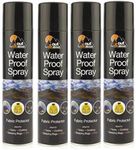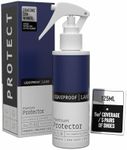Buying Guide for the Best Waterproofer For Clothes
When choosing a waterproofer for clothes, it's important to consider the type of fabric you're treating, the level of water resistance you need, and how often you plan to reapply the product. Waterproofers can help extend the life of your clothing by protecting it from water damage, but selecting the right one requires understanding a few key specifications. This guide will help you navigate these specifications to find the best waterproofer for your needs.Type of WaterprooferWaterproofers come in different forms, such as sprays, washes, and waxes. Sprays are convenient for spot treatments and are easy to apply on most fabrics. Wash-in waterproofers are added to the washing machine and are great for treating multiple items at once, but they may not be suitable for all fabric types. Waxes are typically used for heavy-duty fabrics like canvas. Consider the type of clothing you are treating and how you prefer to apply the product when choosing the type of waterproofer.
Fabric CompatibilityNot all waterproofers are suitable for all fabrics. Some are designed specifically for synthetic materials like nylon and polyester, while others are better for natural fibers like cotton and wool. It's important to choose a waterproofer that is compatible with the fabric of your clothing to ensure effectiveness and prevent damage. Check the product label for fabric compatibility and consider the materials of your clothing when making your selection.
DurabilityThe durability of a waterproofer refers to how long it will last before needing reapplication. Some products offer long-lasting protection that can withstand multiple washes, while others may need to be reapplied more frequently. If you need a waterproofer for clothing that will be exposed to harsh conditions or frequent washing, look for a product with high durability. For occasional use, a less durable option may suffice.
BreathabilityBreathability is important if you want your clothing to remain comfortable while being waterproof. Some waterproofers can make fabrics less breathable, which might be uncomfortable in warm weather or during physical activity. If breathability is a priority, look for products that specifically mention maintaining or enhancing fabric breathability. Consider your typical use scenarios, such as hiking or casual wear, to determine how important breathability is for you.
Environmental ImpactSome waterproofers contain chemicals that can be harmful to the environment. If this is a concern for you, look for products that are labeled as eco-friendly or biodegradable. These products are designed to minimize environmental impact while still providing effective water resistance. Consider your personal values and the importance of environmental sustainability when choosing a waterproofer.















